Comprehensive Report: Contemporary Hospitality Industry & Ritz Hotel
VerifiedAdded on 2022/11/25
|10
|3495
|88
Report
AI Summary
This report provides a comprehensive analysis of the contemporary hospitality industry, with a specific focus on the Ritz Hotel. It explores various aspects, including different business types like lodging and food and beverage, and examines the operational and functional departments within the Ritz Hotel, such as the front office, housekeeping, and kitchen. The report delves into the contribution of the hospitality industry to local, national, and international economies, as well as the interrelationship between the operational and functional departments. It also discusses the role of franchising and licensing in the global development of the hospitality industry and analyzes the contribution of global growth, franchising, and licensing to economic development. Furthermore, the report identifies different types of operational roles within the hospitality industry, the skills required for these roles, and the existing skill gaps. It concludes by examining the impact of these skill gaps and suggests potential solutions. The report uses the Ritz London hotel as a case study throughout the analysis.
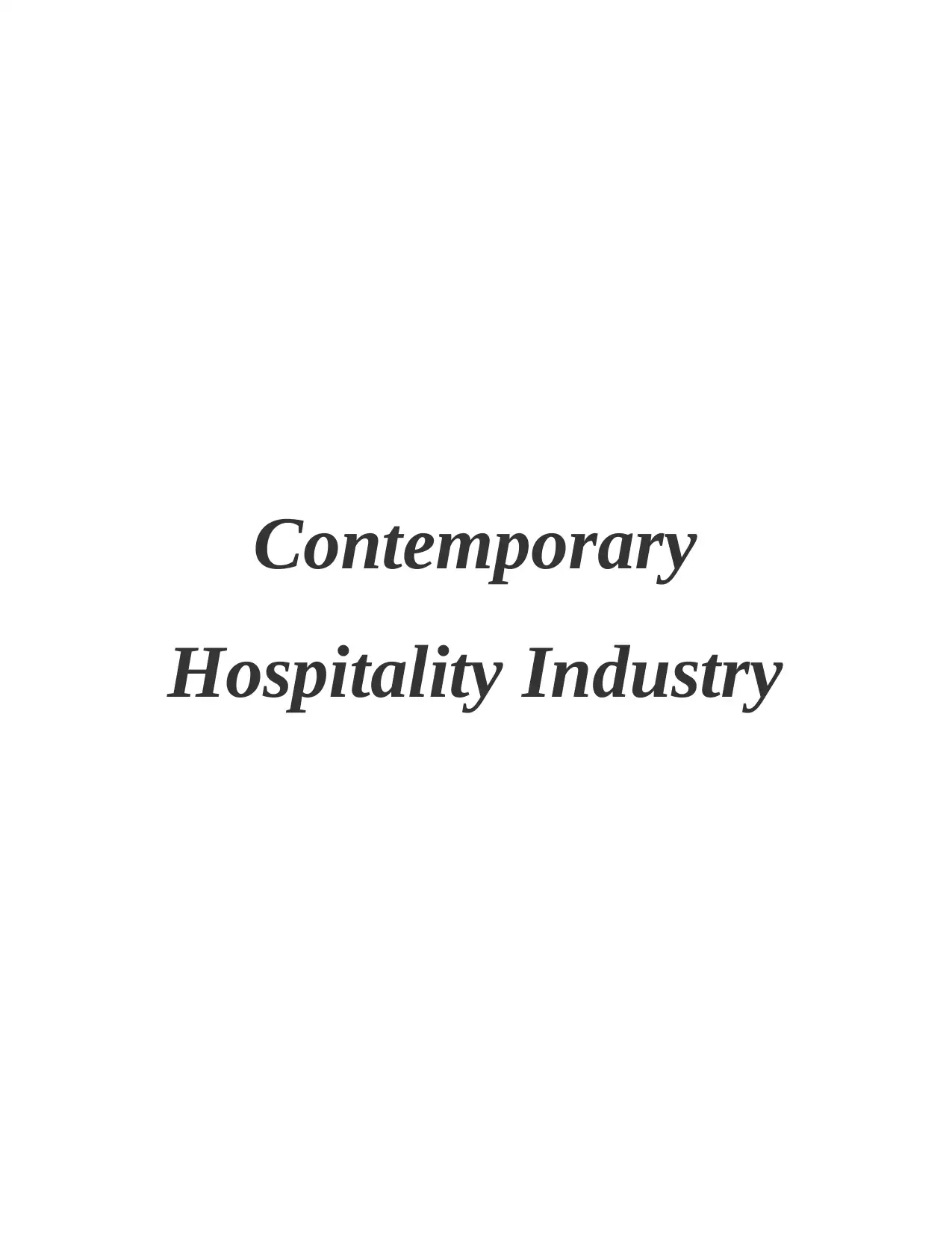
Contemporary
Hospitality Industry
Hospitality Industry
Paraphrase This Document
Need a fresh take? Get an instant paraphrase of this document with our AI Paraphraser
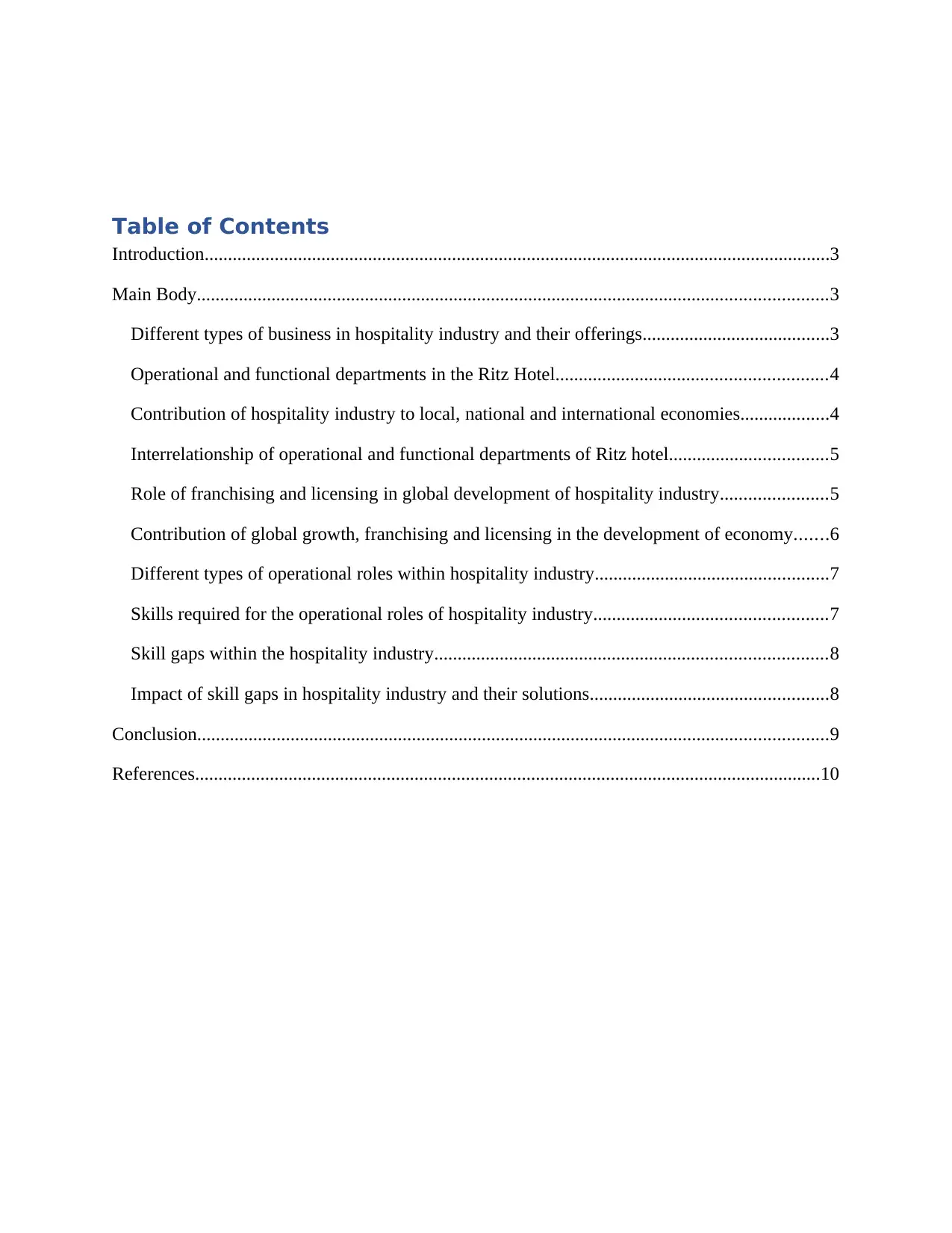
Table of Contents
Introduction......................................................................................................................................3
Main Body.......................................................................................................................................3
Different types of business in hospitality industry and their offerings........................................3
Operational and functional departments in the Ritz Hotel..........................................................4
Contribution of hospitality industry to local, national and international economies...................4
Interrelationship of operational and functional departments of Ritz hotel..................................5
Role of franchising and licensing in global development of hospitality industry.......................5
Contribution of global growth, franchising and licensing in the development of economy.......6
Different types of operational roles within hospitality industry..................................................7
Skills required for the operational roles of hospitality industry..................................................7
Skill gaps within the hospitality industry....................................................................................8
Impact of skill gaps in hospitality industry and their solutions...................................................8
Conclusion.......................................................................................................................................9
References......................................................................................................................................10
Introduction......................................................................................................................................3
Main Body.......................................................................................................................................3
Different types of business in hospitality industry and their offerings........................................3
Operational and functional departments in the Ritz Hotel..........................................................4
Contribution of hospitality industry to local, national and international economies...................4
Interrelationship of operational and functional departments of Ritz hotel..................................5
Role of franchising and licensing in global development of hospitality industry.......................5
Contribution of global growth, franchising and licensing in the development of economy.......6
Different types of operational roles within hospitality industry..................................................7
Skills required for the operational roles of hospitality industry..................................................7
Skill gaps within the hospitality industry....................................................................................8
Impact of skill gaps in hospitality industry and their solutions...................................................8
Conclusion.......................................................................................................................................9
References......................................................................................................................................10
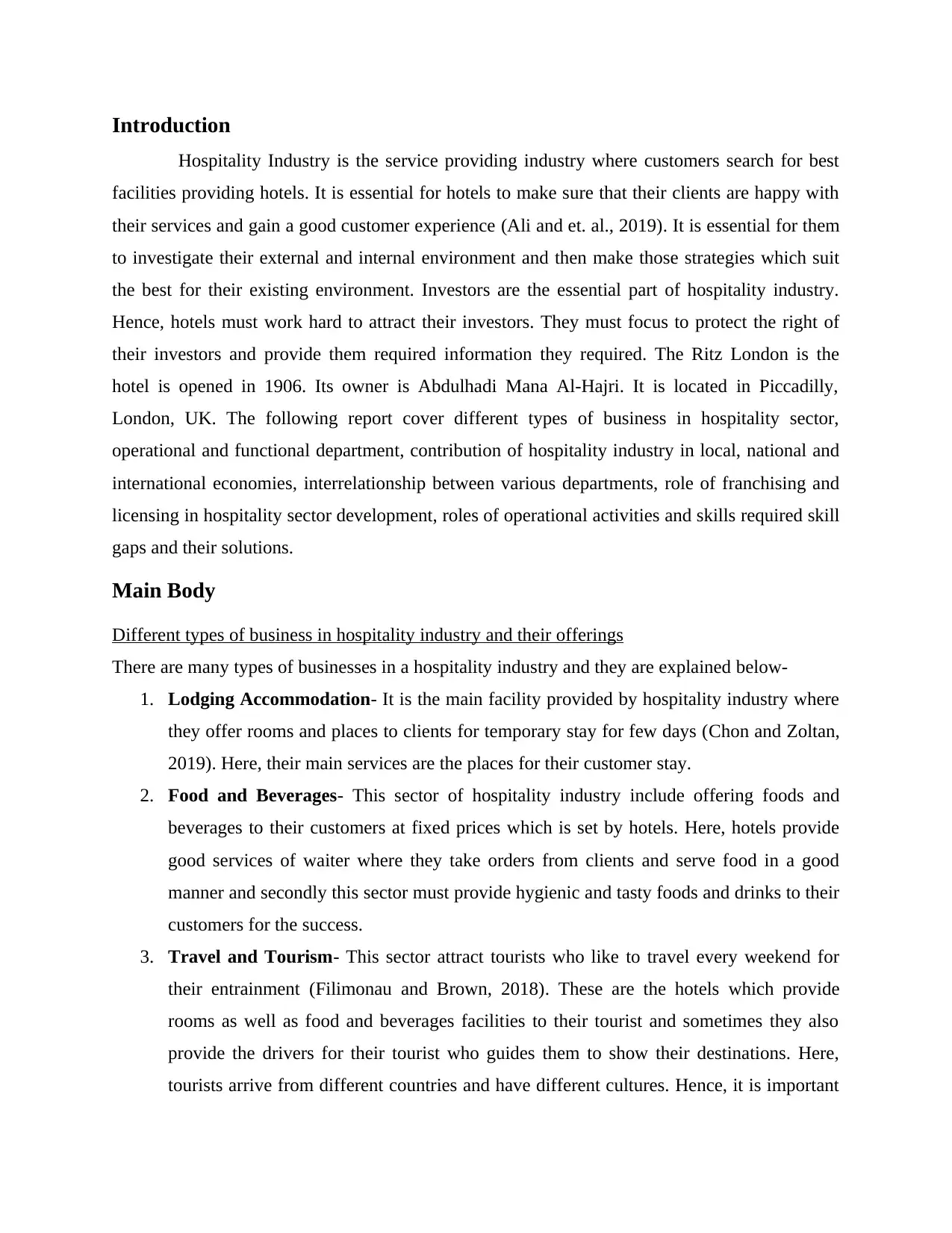
Introduction
Hospitality Industry is the service providing industry where customers search for best
facilities providing hotels. It is essential for hotels to make sure that their clients are happy with
their services and gain a good customer experience (Ali and et. al., 2019). It is essential for them
to investigate their external and internal environment and then make those strategies which suit
the best for their existing environment. Investors are the essential part of hospitality industry.
Hence, hotels must work hard to attract their investors. They must focus to protect the right of
their investors and provide them required information they required. The Ritz London is the
hotel is opened in 1906. Its owner is Abdulhadi Mana Al-Hajri. It is located in Piccadilly,
London, UK. The following report cover different types of business in hospitality sector,
operational and functional department, contribution of hospitality industry in local, national and
international economies, interrelationship between various departments, role of franchising and
licensing in hospitality sector development, roles of operational activities and skills required skill
gaps and their solutions.
Main Body
Different types of business in hospitality industry and their offerings
There are many types of businesses in a hospitality industry and they are explained below-
1. Lodging Accommodation- It is the main facility provided by hospitality industry where
they offer rooms and places to clients for temporary stay for few days (Chon and Zoltan,
2019). Here, their main services are the places for their customer stay.
2. Food and Beverages- This sector of hospitality industry include offering foods and
beverages to their customers at fixed prices which is set by hotels. Here, hotels provide
good services of waiter where they take orders from clients and serve food in a good
manner and secondly this sector must provide hygienic and tasty foods and drinks to their
customers for the success.
3. Travel and Tourism- This sector attract tourists who like to travel every weekend for
their entrainment (Filimonau and Brown, 2018). These are the hotels which provide
rooms as well as food and beverages facilities to their tourist and sometimes they also
provide the drivers for their tourist who guides them to show their destinations. Here,
tourists arrive from different countries and have different cultures. Hence, it is important
Hospitality Industry is the service providing industry where customers search for best
facilities providing hotels. It is essential for hotels to make sure that their clients are happy with
their services and gain a good customer experience (Ali and et. al., 2019). It is essential for them
to investigate their external and internal environment and then make those strategies which suit
the best for their existing environment. Investors are the essential part of hospitality industry.
Hence, hotels must work hard to attract their investors. They must focus to protect the right of
their investors and provide them required information they required. The Ritz London is the
hotel is opened in 1906. Its owner is Abdulhadi Mana Al-Hajri. It is located in Piccadilly,
London, UK. The following report cover different types of business in hospitality sector,
operational and functional department, contribution of hospitality industry in local, national and
international economies, interrelationship between various departments, role of franchising and
licensing in hospitality sector development, roles of operational activities and skills required skill
gaps and their solutions.
Main Body
Different types of business in hospitality industry and their offerings
There are many types of businesses in a hospitality industry and they are explained below-
1. Lodging Accommodation- It is the main facility provided by hospitality industry where
they offer rooms and places to clients for temporary stay for few days (Chon and Zoltan,
2019). Here, their main services are the places for their customer stay.
2. Food and Beverages- This sector of hospitality industry include offering foods and
beverages to their customers at fixed prices which is set by hotels. Here, hotels provide
good services of waiter where they take orders from clients and serve food in a good
manner and secondly this sector must provide hygienic and tasty foods and drinks to their
customers for the success.
3. Travel and Tourism- This sector attract tourists who like to travel every weekend for
their entrainment (Filimonau and Brown, 2018). These are the hotels which provide
rooms as well as food and beverages facilities to their tourist and sometimes they also
provide the drivers for their tourist who guides them to show their destinations. Here,
tourists arrive from different countries and have different cultures. Hence, it is important
⊘ This is a preview!⊘
Do you want full access?
Subscribe today to unlock all pages.

Trusted by 1+ million students worldwide
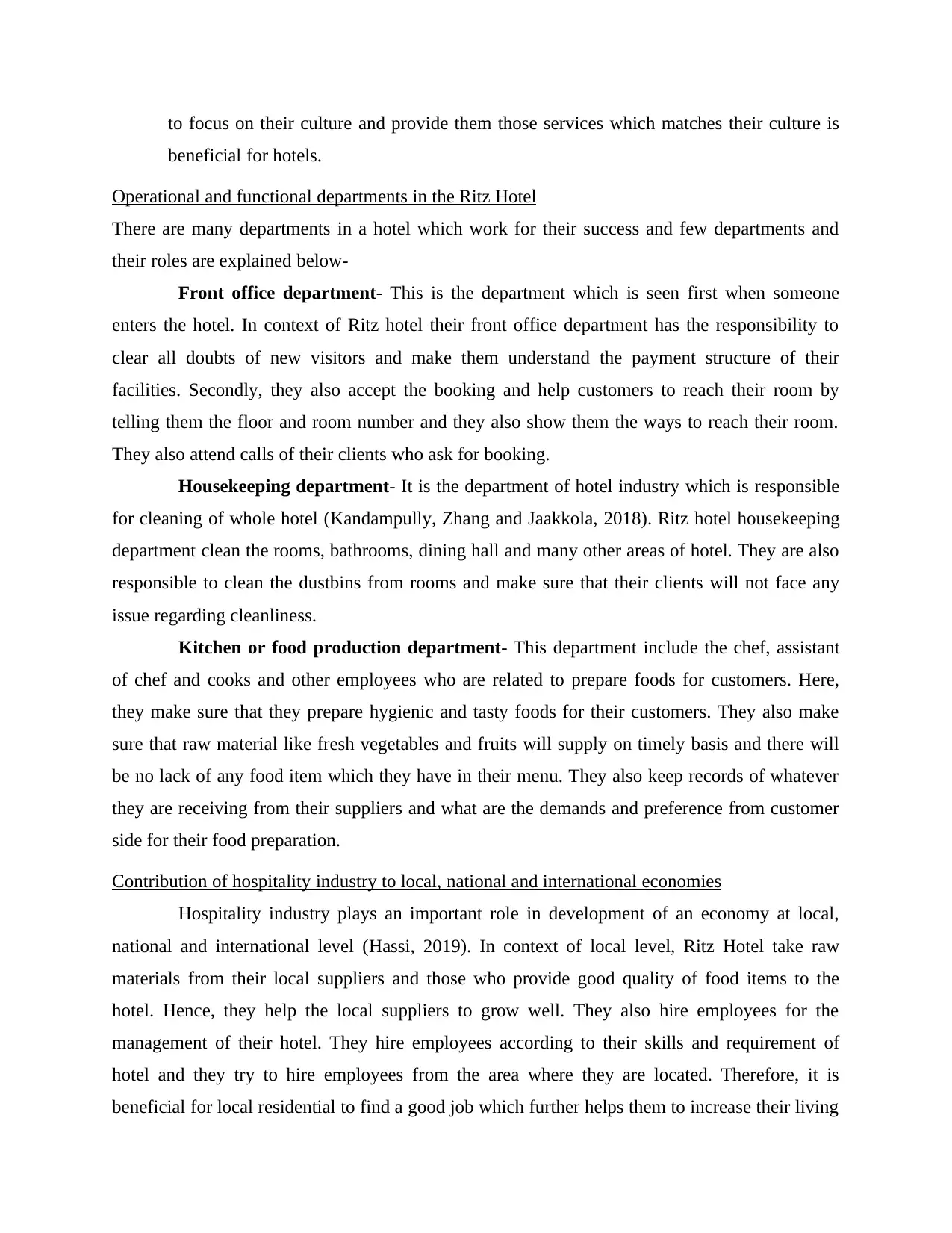
to focus on their culture and provide them those services which matches their culture is
beneficial for hotels.
Operational and functional departments in the Ritz Hotel
There are many departments in a hotel which work for their success and few departments and
their roles are explained below-
Front office department- This is the department which is seen first when someone
enters the hotel. In context of Ritz hotel their front office department has the responsibility to
clear all doubts of new visitors and make them understand the payment structure of their
facilities. Secondly, they also accept the booking and help customers to reach their room by
telling them the floor and room number and they also show them the ways to reach their room.
They also attend calls of their clients who ask for booking.
Housekeeping department- It is the department of hotel industry which is responsible
for cleaning of whole hotel (Kandampully, Zhang and Jaakkola, 2018). Ritz hotel housekeeping
department clean the rooms, bathrooms, dining hall and many other areas of hotel. They are also
responsible to clean the dustbins from rooms and make sure that their clients will not face any
issue regarding cleanliness.
Kitchen or food production department- This department include the chef, assistant
of chef and cooks and other employees who are related to prepare foods for customers. Here,
they make sure that they prepare hygienic and tasty foods for their customers. They also make
sure that raw material like fresh vegetables and fruits will supply on timely basis and there will
be no lack of any food item which they have in their menu. They also keep records of whatever
they are receiving from their suppliers and what are the demands and preference from customer
side for their food preparation.
Contribution of hospitality industry to local, national and international economies
Hospitality industry plays an important role in development of an economy at local,
national and international level (Hassi, 2019). In context of local level, Ritz Hotel take raw
materials from their local suppliers and those who provide good quality of food items to the
hotel. Hence, they help the local suppliers to grow well. They also hire employees for the
management of their hotel. They hire employees according to their skills and requirement of
hotel and they try to hire employees from the area where they are located. Therefore, it is
beneficial for local residential to find a good job which further helps them to increase their living
beneficial for hotels.
Operational and functional departments in the Ritz Hotel
There are many departments in a hotel which work for their success and few departments and
their roles are explained below-
Front office department- This is the department which is seen first when someone
enters the hotel. In context of Ritz hotel their front office department has the responsibility to
clear all doubts of new visitors and make them understand the payment structure of their
facilities. Secondly, they also accept the booking and help customers to reach their room by
telling them the floor and room number and they also show them the ways to reach their room.
They also attend calls of their clients who ask for booking.
Housekeeping department- It is the department of hotel industry which is responsible
for cleaning of whole hotel (Kandampully, Zhang and Jaakkola, 2018). Ritz hotel housekeeping
department clean the rooms, bathrooms, dining hall and many other areas of hotel. They are also
responsible to clean the dustbins from rooms and make sure that their clients will not face any
issue regarding cleanliness.
Kitchen or food production department- This department include the chef, assistant
of chef and cooks and other employees who are related to prepare foods for customers. Here,
they make sure that they prepare hygienic and tasty foods for their customers. They also make
sure that raw material like fresh vegetables and fruits will supply on timely basis and there will
be no lack of any food item which they have in their menu. They also keep records of whatever
they are receiving from their suppliers and what are the demands and preference from customer
side for their food preparation.
Contribution of hospitality industry to local, national and international economies
Hospitality industry plays an important role in development of an economy at local,
national and international level (Hassi, 2019). In context of local level, Ritz Hotel take raw
materials from their local suppliers and those who provide good quality of food items to the
hotel. Hence, they help the local suppliers to grow well. They also hire employees for the
management of their hotel. They hire employees according to their skills and requirement of
hotel and they try to hire employees from the area where they are located. Therefore, it is
beneficial for local residential to find a good job which further helps them to increase their living
Paraphrase This Document
Need a fresh take? Get an instant paraphrase of this document with our AI Paraphraser
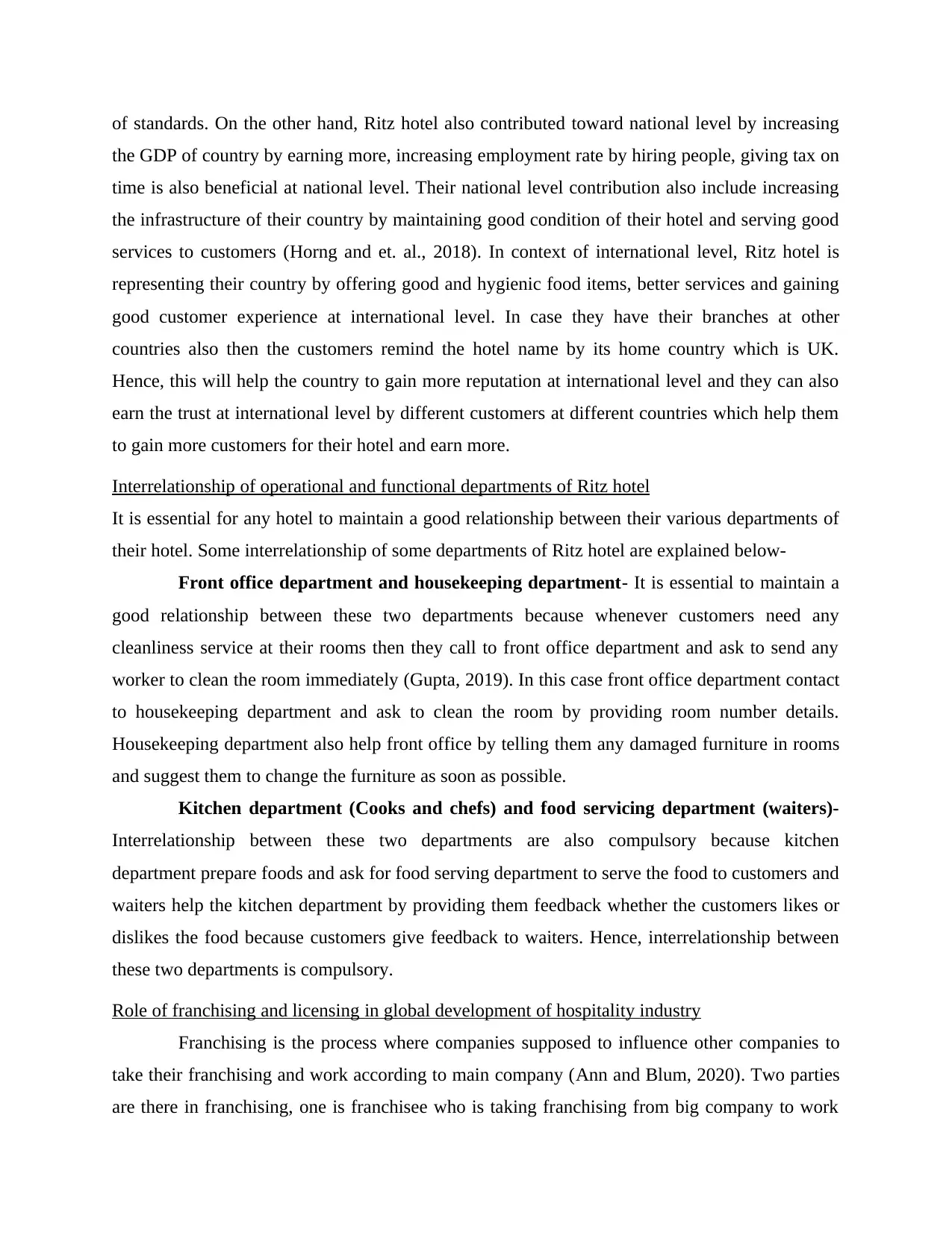
of standards. On the other hand, Ritz hotel also contributed toward national level by increasing
the GDP of country by earning more, increasing employment rate by hiring people, giving tax on
time is also beneficial at national level. Their national level contribution also include increasing
the infrastructure of their country by maintaining good condition of their hotel and serving good
services to customers (Horng and et. al., 2018). In context of international level, Ritz hotel is
representing their country by offering good and hygienic food items, better services and gaining
good customer experience at international level. In case they have their branches at other
countries also then the customers remind the hotel name by its home country which is UK.
Hence, this will help the country to gain more reputation at international level and they can also
earn the trust at international level by different customers at different countries which help them
to gain more customers for their hotel and earn more.
Interrelationship of operational and functional departments of Ritz hotel
It is essential for any hotel to maintain a good relationship between their various departments of
their hotel. Some interrelationship of some departments of Ritz hotel are explained below-
Front office department and housekeeping department- It is essential to maintain a
good relationship between these two departments because whenever customers need any
cleanliness service at their rooms then they call to front office department and ask to send any
worker to clean the room immediately (Gupta, 2019). In this case front office department contact
to housekeeping department and ask to clean the room by providing room number details.
Housekeeping department also help front office by telling them any damaged furniture in rooms
and suggest them to change the furniture as soon as possible.
Kitchen department (Cooks and chefs) and food servicing department (waiters)-
Interrelationship between these two departments are also compulsory because kitchen
department prepare foods and ask for food serving department to serve the food to customers and
waiters help the kitchen department by providing them feedback whether the customers likes or
dislikes the food because customers give feedback to waiters. Hence, interrelationship between
these two departments is compulsory.
Role of franchising and licensing in global development of hospitality industry
Franchising is the process where companies supposed to influence other companies to
take their franchising and work according to main company (Ann and Blum, 2020). Two parties
are there in franchising, one is franchisee who is taking franchising from big company to work
the GDP of country by earning more, increasing employment rate by hiring people, giving tax on
time is also beneficial at national level. Their national level contribution also include increasing
the infrastructure of their country by maintaining good condition of their hotel and serving good
services to customers (Horng and et. al., 2018). In context of international level, Ritz hotel is
representing their country by offering good and hygienic food items, better services and gaining
good customer experience at international level. In case they have their branches at other
countries also then the customers remind the hotel name by its home country which is UK.
Hence, this will help the country to gain more reputation at international level and they can also
earn the trust at international level by different customers at different countries which help them
to gain more customers for their hotel and earn more.
Interrelationship of operational and functional departments of Ritz hotel
It is essential for any hotel to maintain a good relationship between their various departments of
their hotel. Some interrelationship of some departments of Ritz hotel are explained below-
Front office department and housekeeping department- It is essential to maintain a
good relationship between these two departments because whenever customers need any
cleanliness service at their rooms then they call to front office department and ask to send any
worker to clean the room immediately (Gupta, 2019). In this case front office department contact
to housekeeping department and ask to clean the room by providing room number details.
Housekeeping department also help front office by telling them any damaged furniture in rooms
and suggest them to change the furniture as soon as possible.
Kitchen department (Cooks and chefs) and food servicing department (waiters)-
Interrelationship between these two departments are also compulsory because kitchen
department prepare foods and ask for food serving department to serve the food to customers and
waiters help the kitchen department by providing them feedback whether the customers likes or
dislikes the food because customers give feedback to waiters. Hence, interrelationship between
these two departments is compulsory.
Role of franchising and licensing in global development of hospitality industry
Franchising is the process where companies supposed to influence other companies to
take their franchising and work according to main company (Ann and Blum, 2020). Two parties
are there in franchising, one is franchisee who is taking franchising from big company to work
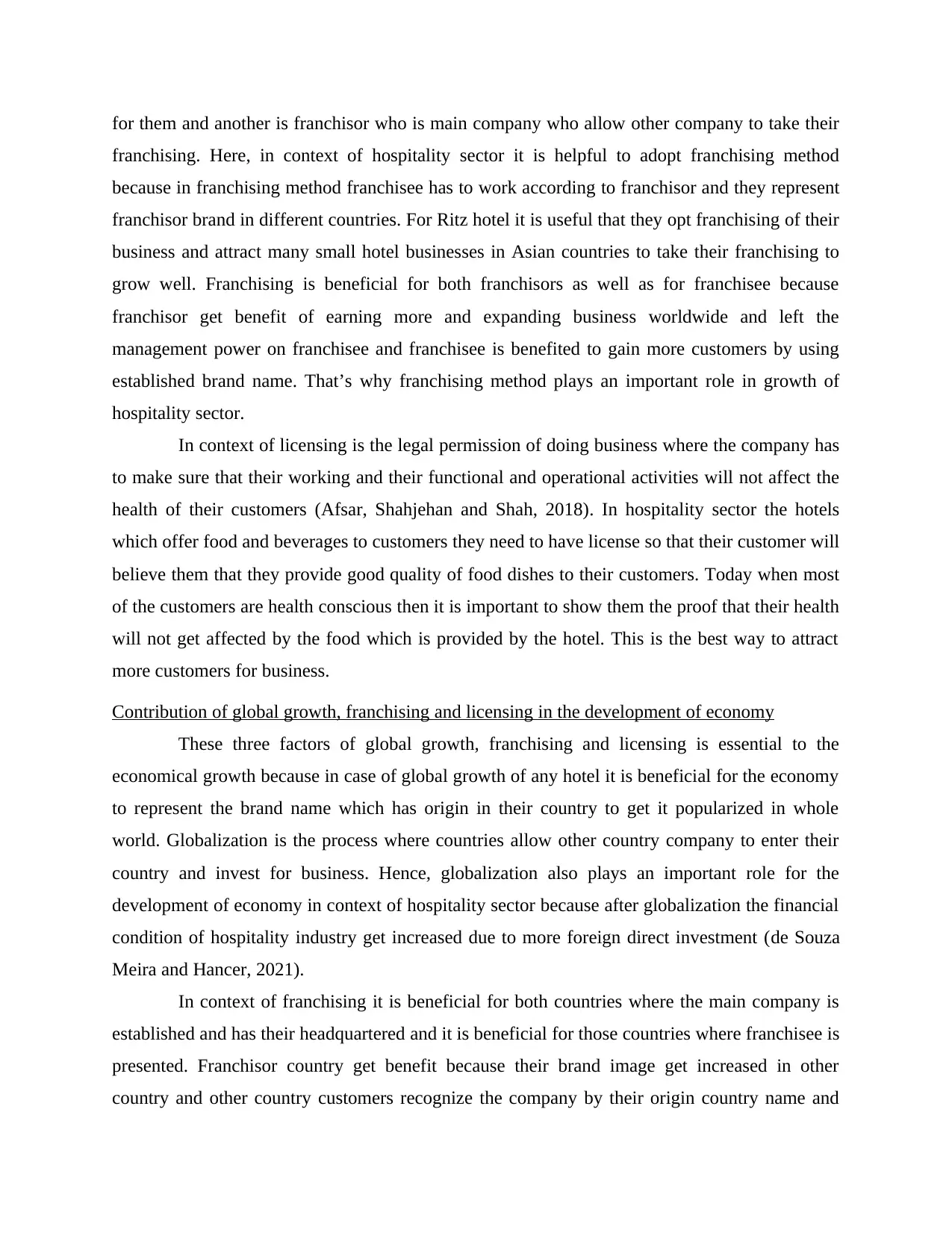
for them and another is franchisor who is main company who allow other company to take their
franchising. Here, in context of hospitality sector it is helpful to adopt franchising method
because in franchising method franchisee has to work according to franchisor and they represent
franchisor brand in different countries. For Ritz hotel it is useful that they opt franchising of their
business and attract many small hotel businesses in Asian countries to take their franchising to
grow well. Franchising is beneficial for both franchisors as well as for franchisee because
franchisor get benefit of earning more and expanding business worldwide and left the
management power on franchisee and franchisee is benefited to gain more customers by using
established brand name. That’s why franchising method plays an important role in growth of
hospitality sector.
In context of licensing is the legal permission of doing business where the company has
to make sure that their working and their functional and operational activities will not affect the
health of their customers (Afsar, Shahjehan and Shah, 2018). In hospitality sector the hotels
which offer food and beverages to customers they need to have license so that their customer will
believe them that they provide good quality of food dishes to their customers. Today when most
of the customers are health conscious then it is important to show them the proof that their health
will not get affected by the food which is provided by the hotel. This is the best way to attract
more customers for business.
Contribution of global growth, franchising and licensing in the development of economy
These three factors of global growth, franchising and licensing is essential to the
economical growth because in case of global growth of any hotel it is beneficial for the economy
to represent the brand name which has origin in their country to get it popularized in whole
world. Globalization is the process where countries allow other country company to enter their
country and invest for business. Hence, globalization also plays an important role for the
development of economy in context of hospitality sector because after globalization the financial
condition of hospitality industry get increased due to more foreign direct investment (de Souza
Meira and Hancer, 2021).
In context of franchising it is beneficial for both countries where the main company is
established and has their headquartered and it is beneficial for those countries where franchisee is
presented. Franchisor country get benefit because their brand image get increased in other
country and other country customers recognize the company by their origin country name and
franchising. Here, in context of hospitality sector it is helpful to adopt franchising method
because in franchising method franchisee has to work according to franchisor and they represent
franchisor brand in different countries. For Ritz hotel it is useful that they opt franchising of their
business and attract many small hotel businesses in Asian countries to take their franchising to
grow well. Franchising is beneficial for both franchisors as well as for franchisee because
franchisor get benefit of earning more and expanding business worldwide and left the
management power on franchisee and franchisee is benefited to gain more customers by using
established brand name. That’s why franchising method plays an important role in growth of
hospitality sector.
In context of licensing is the legal permission of doing business where the company has
to make sure that their working and their functional and operational activities will not affect the
health of their customers (Afsar, Shahjehan and Shah, 2018). In hospitality sector the hotels
which offer food and beverages to customers they need to have license so that their customer will
believe them that they provide good quality of food dishes to their customers. Today when most
of the customers are health conscious then it is important to show them the proof that their health
will not get affected by the food which is provided by the hotel. This is the best way to attract
more customers for business.
Contribution of global growth, franchising and licensing in the development of economy
These three factors of global growth, franchising and licensing is essential to the
economical growth because in case of global growth of any hotel it is beneficial for the economy
to represent the brand name which has origin in their country to get it popularized in whole
world. Globalization is the process where countries allow other country company to enter their
country and invest for business. Hence, globalization also plays an important role for the
development of economy in context of hospitality sector because after globalization the financial
condition of hospitality industry get increased due to more foreign direct investment (de Souza
Meira and Hancer, 2021).
In context of franchising it is beneficial for both countries where the main company is
established and has their headquartered and it is beneficial for those countries where franchisee is
presented. Franchisor country get benefit because their brand image get increased in other
country and other country customers recognize the company by their origin country name and
⊘ This is a preview!⊘
Do you want full access?
Subscribe today to unlock all pages.

Trusted by 1+ million students worldwide
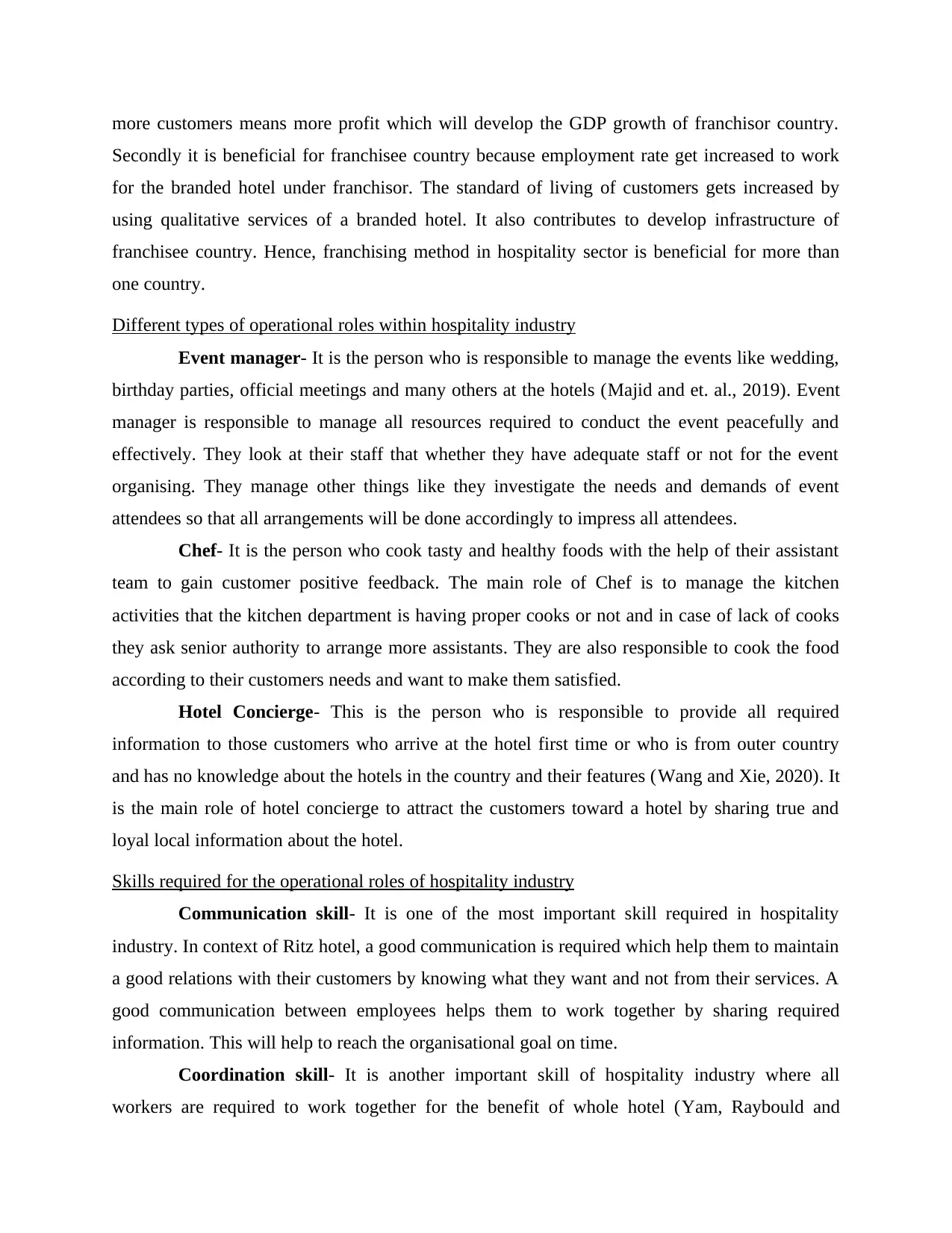
more customers means more profit which will develop the GDP growth of franchisor country.
Secondly it is beneficial for franchisee country because employment rate get increased to work
for the branded hotel under franchisor. The standard of living of customers gets increased by
using qualitative services of a branded hotel. It also contributes to develop infrastructure of
franchisee country. Hence, franchising method in hospitality sector is beneficial for more than
one country.
Different types of operational roles within hospitality industry
Event manager- It is the person who is responsible to manage the events like wedding,
birthday parties, official meetings and many others at the hotels (Majid and et. al., 2019). Event
manager is responsible to manage all resources required to conduct the event peacefully and
effectively. They look at their staff that whether they have adequate staff or not for the event
organising. They manage other things like they investigate the needs and demands of event
attendees so that all arrangements will be done accordingly to impress all attendees.
Chef- It is the person who cook tasty and healthy foods with the help of their assistant
team to gain customer positive feedback. The main role of Chef is to manage the kitchen
activities that the kitchen department is having proper cooks or not and in case of lack of cooks
they ask senior authority to arrange more assistants. They are also responsible to cook the food
according to their customers needs and want to make them satisfied.
Hotel Concierge- This is the person who is responsible to provide all required
information to those customers who arrive at the hotel first time or who is from outer country
and has no knowledge about the hotels in the country and their features (Wang and Xie, 2020). It
is the main role of hotel concierge to attract the customers toward a hotel by sharing true and
loyal local information about the hotel.
Skills required for the operational roles of hospitality industry
Communication skill- It is one of the most important skill required in hospitality
industry. In context of Ritz hotel, a good communication is required which help them to maintain
a good relations with their customers by knowing what they want and not from their services. A
good communication between employees helps them to work together by sharing required
information. This will help to reach the organisational goal on time.
Coordination skill- It is another important skill of hospitality industry where all
workers are required to work together for the benefit of whole hotel (Yam, Raybould and
Secondly it is beneficial for franchisee country because employment rate get increased to work
for the branded hotel under franchisor. The standard of living of customers gets increased by
using qualitative services of a branded hotel. It also contributes to develop infrastructure of
franchisee country. Hence, franchising method in hospitality sector is beneficial for more than
one country.
Different types of operational roles within hospitality industry
Event manager- It is the person who is responsible to manage the events like wedding,
birthday parties, official meetings and many others at the hotels (Majid and et. al., 2019). Event
manager is responsible to manage all resources required to conduct the event peacefully and
effectively. They look at their staff that whether they have adequate staff or not for the event
organising. They manage other things like they investigate the needs and demands of event
attendees so that all arrangements will be done accordingly to impress all attendees.
Chef- It is the person who cook tasty and healthy foods with the help of their assistant
team to gain customer positive feedback. The main role of Chef is to manage the kitchen
activities that the kitchen department is having proper cooks or not and in case of lack of cooks
they ask senior authority to arrange more assistants. They are also responsible to cook the food
according to their customers needs and want to make them satisfied.
Hotel Concierge- This is the person who is responsible to provide all required
information to those customers who arrive at the hotel first time or who is from outer country
and has no knowledge about the hotels in the country and their features (Wang and Xie, 2020). It
is the main role of hotel concierge to attract the customers toward a hotel by sharing true and
loyal local information about the hotel.
Skills required for the operational roles of hospitality industry
Communication skill- It is one of the most important skill required in hospitality
industry. In context of Ritz hotel, a good communication is required which help them to maintain
a good relations with their customers by knowing what they want and not from their services. A
good communication between employees helps them to work together by sharing required
information. This will help to reach the organisational goal on time.
Coordination skill- It is another important skill of hospitality industry where all
workers are required to work together for the benefit of whole hotel (Yam, Raybould and
Paraphrase This Document
Need a fresh take? Get an instant paraphrase of this document with our AI Paraphraser
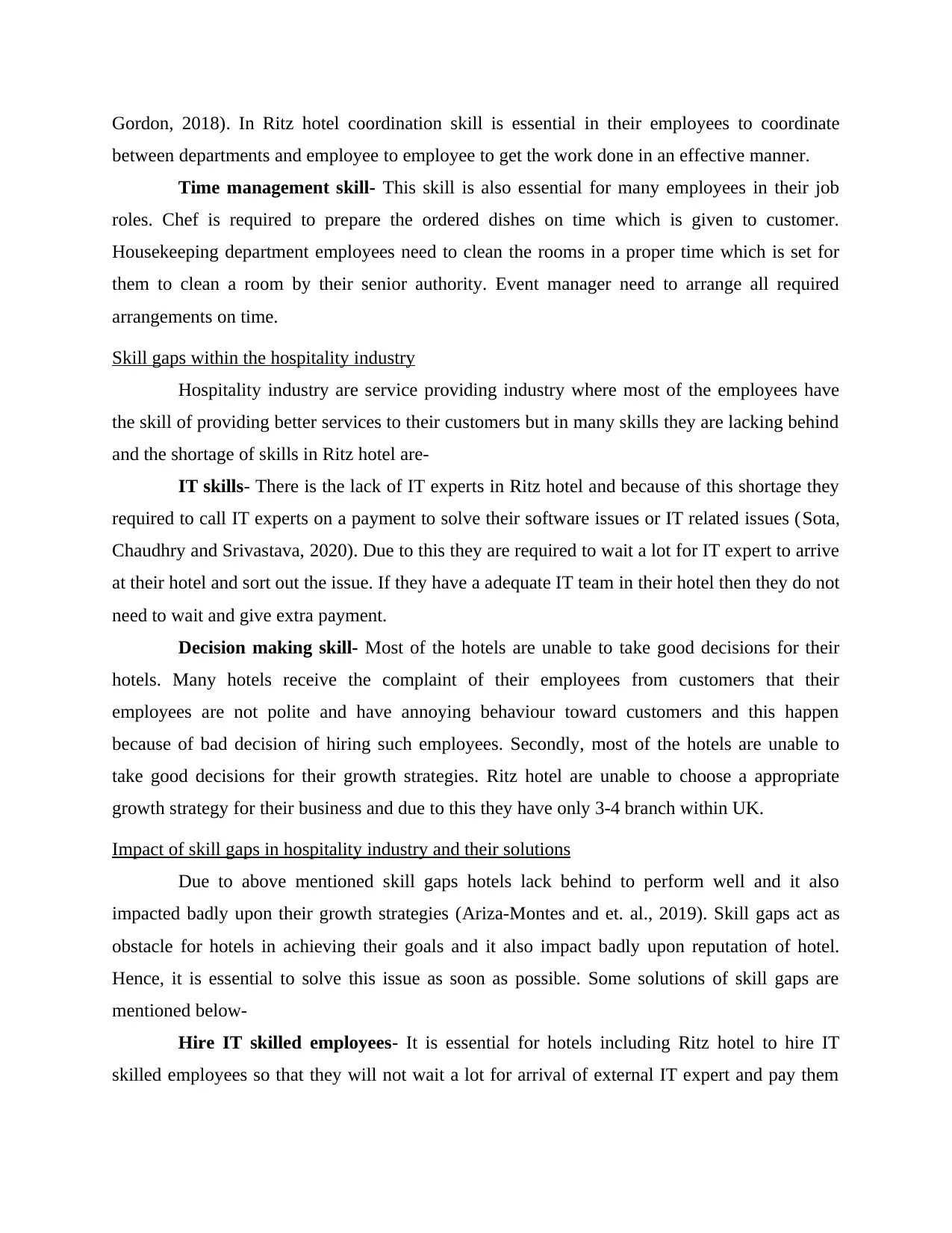
Gordon, 2018). In Ritz hotel coordination skill is essential in their employees to coordinate
between departments and employee to employee to get the work done in an effective manner.
Time management skill- This skill is also essential for many employees in their job
roles. Chef is required to prepare the ordered dishes on time which is given to customer.
Housekeeping department employees need to clean the rooms in a proper time which is set for
them to clean a room by their senior authority. Event manager need to arrange all required
arrangements on time.
Skill gaps within the hospitality industry
Hospitality industry are service providing industry where most of the employees have
the skill of providing better services to their customers but in many skills they are lacking behind
and the shortage of skills in Ritz hotel are-
IT skills- There is the lack of IT experts in Ritz hotel and because of this shortage they
required to call IT experts on a payment to solve their software issues or IT related issues (Sota,
Chaudhry and Srivastava, 2020). Due to this they are required to wait a lot for IT expert to arrive
at their hotel and sort out the issue. If they have a adequate IT team in their hotel then they do not
need to wait and give extra payment.
Decision making skill- Most of the hotels are unable to take good decisions for their
hotels. Many hotels receive the complaint of their employees from customers that their
employees are not polite and have annoying behaviour toward customers and this happen
because of bad decision of hiring such employees. Secondly, most of the hotels are unable to
take good decisions for their growth strategies. Ritz hotel are unable to choose a appropriate
growth strategy for their business and due to this they have only 3-4 branch within UK.
Impact of skill gaps in hospitality industry and their solutions
Due to above mentioned skill gaps hotels lack behind to perform well and it also
impacted badly upon their growth strategies (Ariza-Montes and et. al., 2019). Skill gaps act as
obstacle for hotels in achieving their goals and it also impact badly upon reputation of hotel.
Hence, it is essential to solve this issue as soon as possible. Some solutions of skill gaps are
mentioned below-
Hire IT skilled employees- It is essential for hotels including Ritz hotel to hire IT
skilled employees so that they will not wait a lot for arrival of external IT expert and pay them
between departments and employee to employee to get the work done in an effective manner.
Time management skill- This skill is also essential for many employees in their job
roles. Chef is required to prepare the ordered dishes on time which is given to customer.
Housekeeping department employees need to clean the rooms in a proper time which is set for
them to clean a room by their senior authority. Event manager need to arrange all required
arrangements on time.
Skill gaps within the hospitality industry
Hospitality industry are service providing industry where most of the employees have
the skill of providing better services to their customers but in many skills they are lacking behind
and the shortage of skills in Ritz hotel are-
IT skills- There is the lack of IT experts in Ritz hotel and because of this shortage they
required to call IT experts on a payment to solve their software issues or IT related issues (Sota,
Chaudhry and Srivastava, 2020). Due to this they are required to wait a lot for IT expert to arrive
at their hotel and sort out the issue. If they have a adequate IT team in their hotel then they do not
need to wait and give extra payment.
Decision making skill- Most of the hotels are unable to take good decisions for their
hotels. Many hotels receive the complaint of their employees from customers that their
employees are not polite and have annoying behaviour toward customers and this happen
because of bad decision of hiring such employees. Secondly, most of the hotels are unable to
take good decisions for their growth strategies. Ritz hotel are unable to choose a appropriate
growth strategy for their business and due to this they have only 3-4 branch within UK.
Impact of skill gaps in hospitality industry and their solutions
Due to above mentioned skill gaps hotels lack behind to perform well and it also
impacted badly upon their growth strategies (Ariza-Montes and et. al., 2019). Skill gaps act as
obstacle for hotels in achieving their goals and it also impact badly upon reputation of hotel.
Hence, it is essential to solve this issue as soon as possible. Some solutions of skill gaps are
mentioned below-
Hire IT skilled employees- It is essential for hotels including Ritz hotel to hire IT
skilled employees so that they will not wait a lot for arrival of external IT expert and pay them
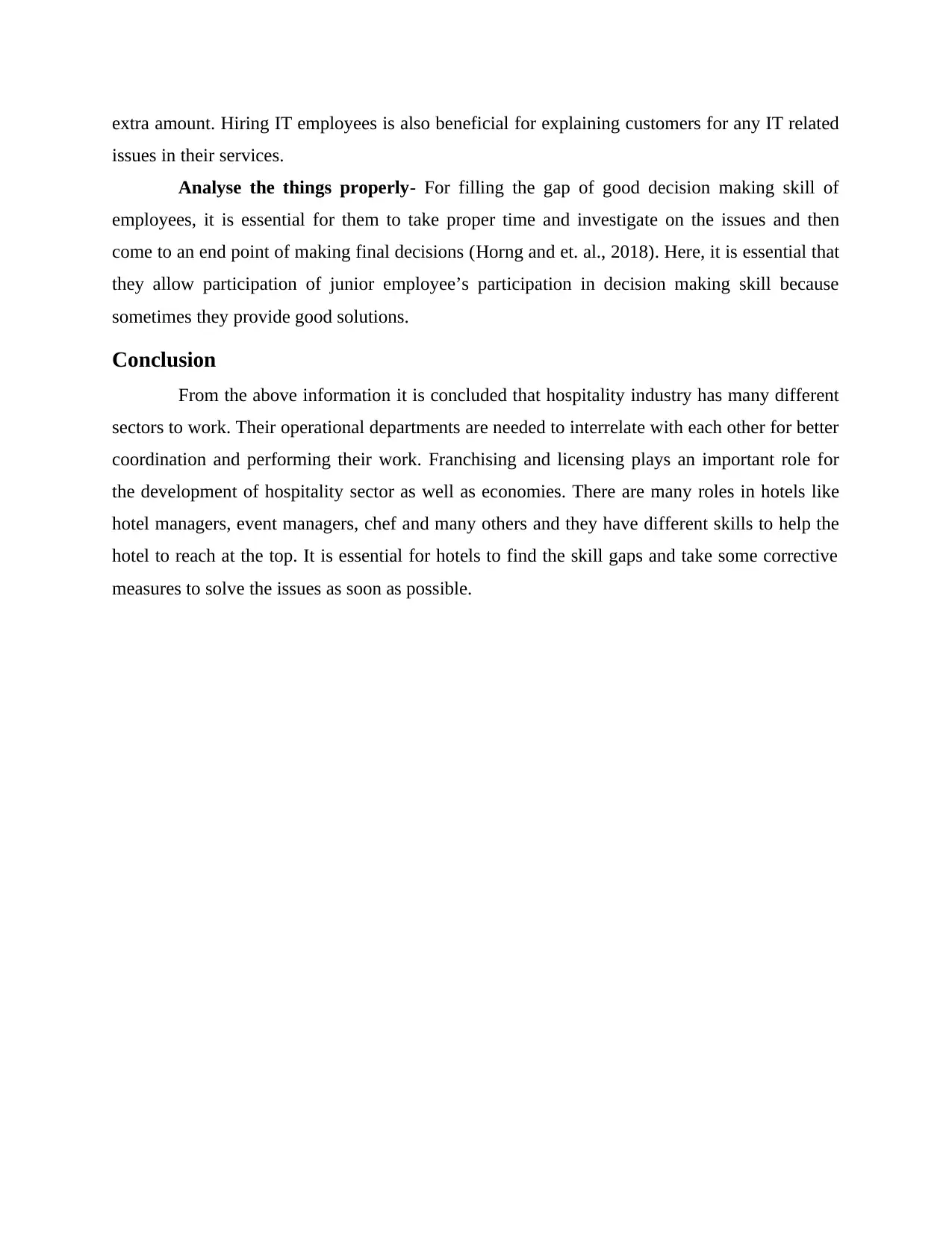
extra amount. Hiring IT employees is also beneficial for explaining customers for any IT related
issues in their services.
Analyse the things properly- For filling the gap of good decision making skill of
employees, it is essential for them to take proper time and investigate on the issues and then
come to an end point of making final decisions (Horng and et. al., 2018). Here, it is essential that
they allow participation of junior employee’s participation in decision making skill because
sometimes they provide good solutions.
Conclusion
From the above information it is concluded that hospitality industry has many different
sectors to work. Their operational departments are needed to interrelate with each other for better
coordination and performing their work. Franchising and licensing plays an important role for
the development of hospitality sector as well as economies. There are many roles in hotels like
hotel managers, event managers, chef and many others and they have different skills to help the
hotel to reach at the top. It is essential for hotels to find the skill gaps and take some corrective
measures to solve the issues as soon as possible.
issues in their services.
Analyse the things properly- For filling the gap of good decision making skill of
employees, it is essential for them to take proper time and investigate on the issues and then
come to an end point of making final decisions (Horng and et. al., 2018). Here, it is essential that
they allow participation of junior employee’s participation in decision making skill because
sometimes they provide good solutions.
Conclusion
From the above information it is concluded that hospitality industry has many different
sectors to work. Their operational departments are needed to interrelate with each other for better
coordination and performing their work. Franchising and licensing plays an important role for
the development of hospitality sector as well as economies. There are many roles in hotels like
hotel managers, event managers, chef and many others and they have different skills to help the
hotel to reach at the top. It is essential for hotels to find the skill gaps and take some corrective
measures to solve the issues as soon as possible.
⊘ This is a preview!⊘
Do you want full access?
Subscribe today to unlock all pages.

Trusted by 1+ million students worldwide
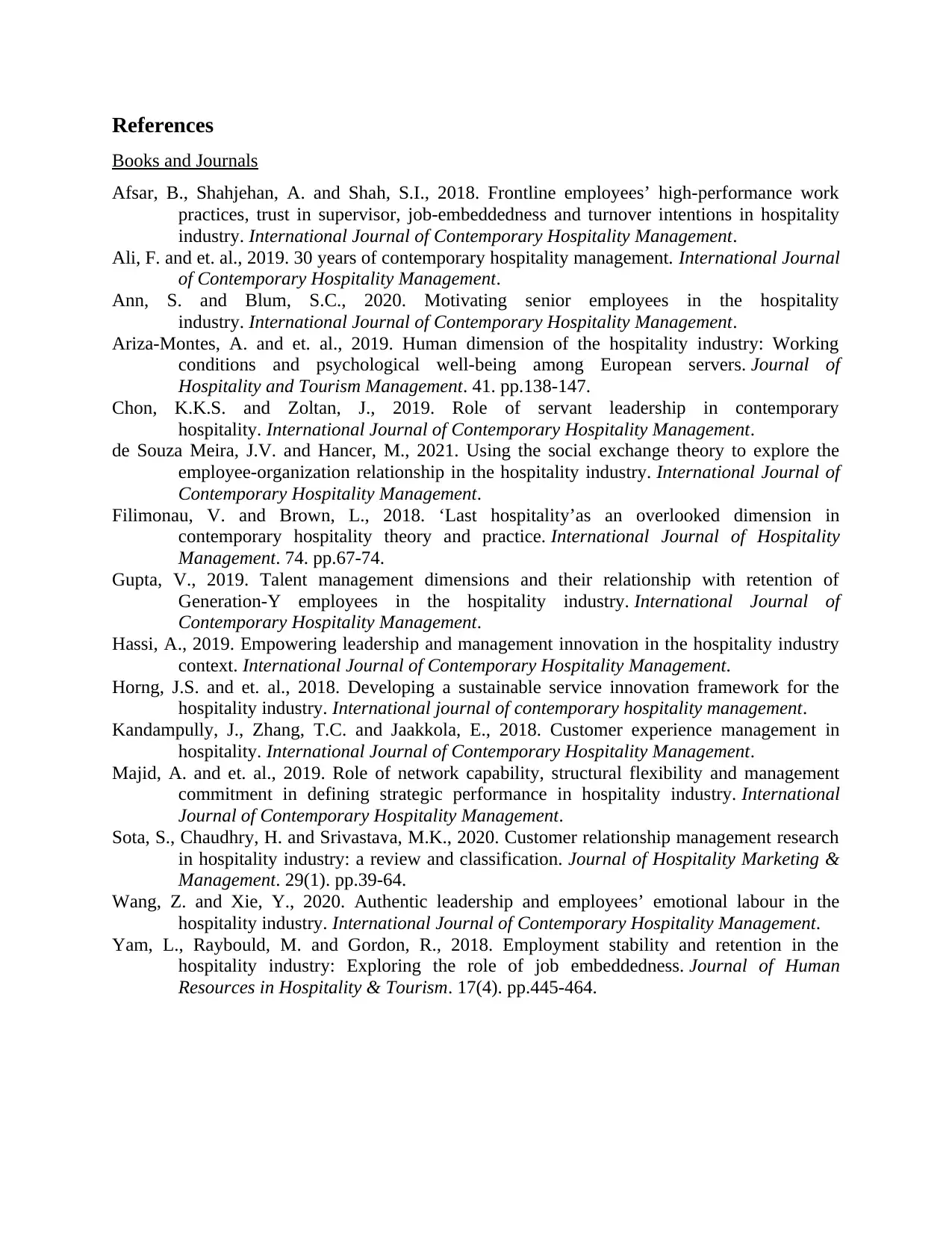
References
Books and Journals
Afsar, B., Shahjehan, A. and Shah, S.I., 2018. Frontline employees’ high-performance work
practices, trust in supervisor, job-embeddedness and turnover intentions in hospitality
industry. International Journal of Contemporary Hospitality Management.
Ali, F. and et. al., 2019. 30 years of contemporary hospitality management. International Journal
of Contemporary Hospitality Management.
Ann, S. and Blum, S.C., 2020. Motivating senior employees in the hospitality
industry. International Journal of Contemporary Hospitality Management.
Ariza-Montes, A. and et. al., 2019. Human dimension of the hospitality industry: Working
conditions and psychological well-being among European servers. Journal of
Hospitality and Tourism Management. 41. pp.138-147.
Chon, K.K.S. and Zoltan, J., 2019. Role of servant leadership in contemporary
hospitality. International Journal of Contemporary Hospitality Management.
de Souza Meira, J.V. and Hancer, M., 2021. Using the social exchange theory to explore the
employee-organization relationship in the hospitality industry. International Journal of
Contemporary Hospitality Management.
Filimonau, V. and Brown, L., 2018. ‘Last hospitality’as an overlooked dimension in
contemporary hospitality theory and practice. International Journal of Hospitality
Management. 74. pp.67-74.
Gupta, V., 2019. Talent management dimensions and their relationship with retention of
Generation-Y employees in the hospitality industry. International Journal of
Contemporary Hospitality Management.
Hassi, A., 2019. Empowering leadership and management innovation in the hospitality industry
context. International Journal of Contemporary Hospitality Management.
Horng, J.S. and et. al., 2018. Developing a sustainable service innovation framework for the
hospitality industry. International journal of contemporary hospitality management.
Kandampully, J., Zhang, T.C. and Jaakkola, E., 2018. Customer experience management in
hospitality. International Journal of Contemporary Hospitality Management.
Majid, A. and et. al., 2019. Role of network capability, structural flexibility and management
commitment in defining strategic performance in hospitality industry. International
Journal of Contemporary Hospitality Management.
Sota, S., Chaudhry, H. and Srivastava, M.K., 2020. Customer relationship management research
in hospitality industry: a review and classification. Journal of Hospitality Marketing &
Management. 29(1). pp.39-64.
Wang, Z. and Xie, Y., 2020. Authentic leadership and employees’ emotional labour in the
hospitality industry. International Journal of Contemporary Hospitality Management.
Yam, L., Raybould, M. and Gordon, R., 2018. Employment stability and retention in the
hospitality industry: Exploring the role of job embeddedness. Journal of Human
Resources in Hospitality & Tourism. 17(4). pp.445-464.
Books and Journals
Afsar, B., Shahjehan, A. and Shah, S.I., 2018. Frontline employees’ high-performance work
practices, trust in supervisor, job-embeddedness and turnover intentions in hospitality
industry. International Journal of Contemporary Hospitality Management.
Ali, F. and et. al., 2019. 30 years of contemporary hospitality management. International Journal
of Contemporary Hospitality Management.
Ann, S. and Blum, S.C., 2020. Motivating senior employees in the hospitality
industry. International Journal of Contemporary Hospitality Management.
Ariza-Montes, A. and et. al., 2019. Human dimension of the hospitality industry: Working
conditions and psychological well-being among European servers. Journal of
Hospitality and Tourism Management. 41. pp.138-147.
Chon, K.K.S. and Zoltan, J., 2019. Role of servant leadership in contemporary
hospitality. International Journal of Contemporary Hospitality Management.
de Souza Meira, J.V. and Hancer, M., 2021. Using the social exchange theory to explore the
employee-organization relationship in the hospitality industry. International Journal of
Contemporary Hospitality Management.
Filimonau, V. and Brown, L., 2018. ‘Last hospitality’as an overlooked dimension in
contemporary hospitality theory and practice. International Journal of Hospitality
Management. 74. pp.67-74.
Gupta, V., 2019. Talent management dimensions and their relationship with retention of
Generation-Y employees in the hospitality industry. International Journal of
Contemporary Hospitality Management.
Hassi, A., 2019. Empowering leadership and management innovation in the hospitality industry
context. International Journal of Contemporary Hospitality Management.
Horng, J.S. and et. al., 2018. Developing a sustainable service innovation framework for the
hospitality industry. International journal of contemporary hospitality management.
Kandampully, J., Zhang, T.C. and Jaakkola, E., 2018. Customer experience management in
hospitality. International Journal of Contemporary Hospitality Management.
Majid, A. and et. al., 2019. Role of network capability, structural flexibility and management
commitment in defining strategic performance in hospitality industry. International
Journal of Contemporary Hospitality Management.
Sota, S., Chaudhry, H. and Srivastava, M.K., 2020. Customer relationship management research
in hospitality industry: a review and classification. Journal of Hospitality Marketing &
Management. 29(1). pp.39-64.
Wang, Z. and Xie, Y., 2020. Authentic leadership and employees’ emotional labour in the
hospitality industry. International Journal of Contemporary Hospitality Management.
Yam, L., Raybould, M. and Gordon, R., 2018. Employment stability and retention in the
hospitality industry: Exploring the role of job embeddedness. Journal of Human
Resources in Hospitality & Tourism. 17(4). pp.445-464.
1 out of 10
Related Documents
Your All-in-One AI-Powered Toolkit for Academic Success.
+13062052269
info@desklib.com
Available 24*7 on WhatsApp / Email
![[object Object]](/_next/static/media/star-bottom.7253800d.svg)
Unlock your academic potential
Copyright © 2020–2026 A2Z Services. All Rights Reserved. Developed and managed by ZUCOL.




